Mental Health First Aid
Additional material to support your information poster, with a quiz to test your knowledge.
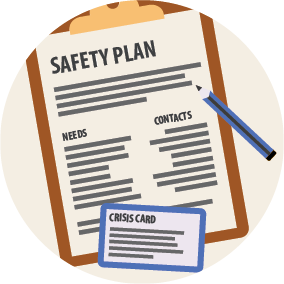


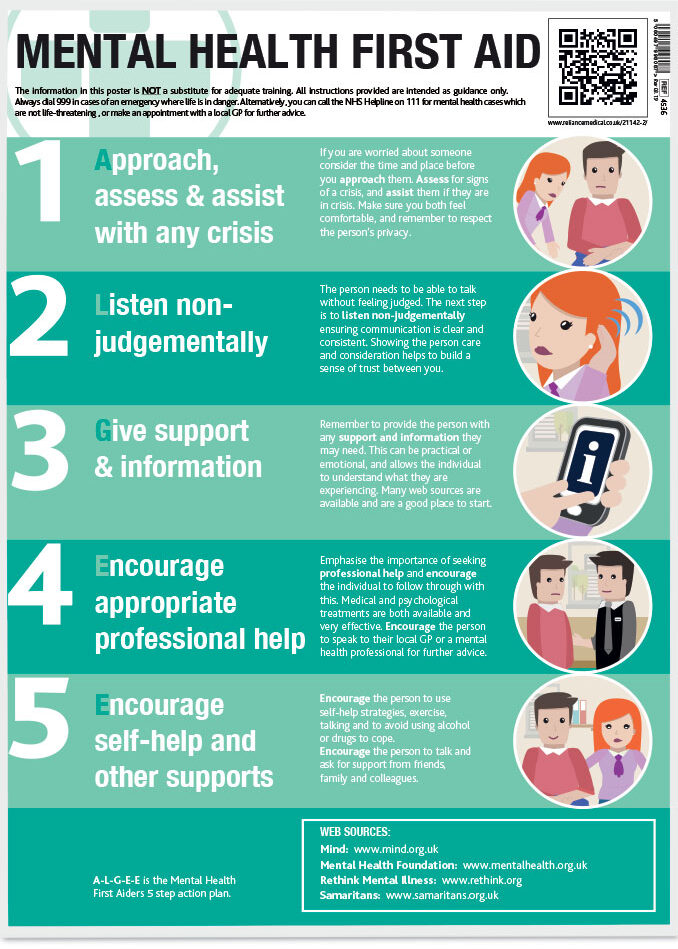
The Mental Health Act (1983)
The Mental Health Act (1983, revised 2007,) defines mental illness as any disorder or disability of the mind. The regulations aim to enforce the rights of people with mental disorders and to ensure that they are receiving the treatment they need. The act sets out a clear framework for professionals to work to.
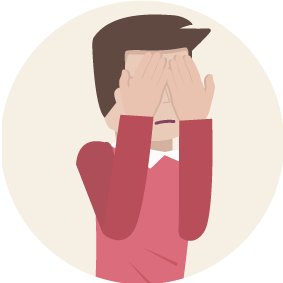
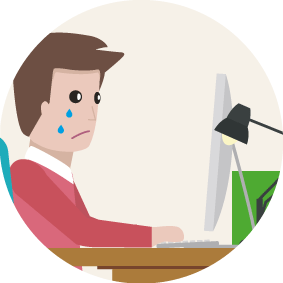
Mental health conditions, work and the workplace.
One in four people in the UK will have a mental health problem at some point. While mental health problems are common, most are mild, tend to be short-term, and are normally successfully treated with medication by a GP.
Mental health is about how we think, feel, and behave. Anxiety and depression are the most common mental health problems. They are often a reaction to a difficult life event such as bereavement, but can also be caused by work-related issues.
Work-related stress can aggravate pre-existing conditions, and problems at work can bring on symptoms or make their effects worse. It can lead to both physical and psychological damage, including anxiety and depression.
Whether work is causing the health issue or aggravating it, employers have a legal responsibility to help their employees. Work-related mental health issues must be assessed to measure the levels of risk to staff. Where a risk is identified, steps must be taken to remove it, or reduce it as far as reasonably practicable.
Some employees will have a pre-existing physical or mental health condition when recruited, or may develop one caused by factors that are not work-related.
Their employers may have further legal requirements to make reasonable adjustments under equalities legislation. Information about employing people with a disability can be found on GOV.UK or from the Equality and Human Rights Commission in England, Scotland, and Wales.
There is advice for line managers that will help them to support their employees with mental health conditions.


How employers can support people with mental health conditions.
In 2017, the government commissioned Lord Stevenson and Paul Farmer (Chief Executive of Mind), to independently review the role employers can play to better support individuals with mental health conditions in the workplace.
The ‘Thriving at Work’ report sets out a framework of actions – called ‘Core Standards’ – that the reviewers recommend employers of all sizes can and should put in place:
• Produce, implement, and communicate a mental health at work plan that promotes good mental health of all employees and outlines the support available for those who may need it.
• Develop mental health awareness among employees by making information, tools and support accessible.
• During the recruitment process, encourage open conversations about mental health and the support that is available to employees who are struggling. At regular intervals throughout employment, offer appropriate workplace adjustments to employees who require them.
• Provide employees with good working conditions and ensure they have a healthy work-life balance and opportunities for development.
• Promote effective people management to ensure all employees have a regular conversation about their health and well-being with their line manager, supervisor, or organisational leader, and train and support line managers and supervisors in effective management practices.
• Routinely monitor employee mental health and wellbeing by understanding available data, talking to employees, and understanding risk factors.
The core standards have been designed to help employers improve the mental health of their workplace and enable individuals with mental health conditions to thrive.
By taking action on work-related stress, either through using the HSE Management Standards or an equivalent approach, employers will meet parts of the core standards framework, as they will:
• Form part of a mental health at work plan.
• Promote communications and open conversations, by raising awareness and reducing stigma.
• Provide a mechanism for monitoring actions and outcomes.
Source: https://www.hse.gov.uk/stress/mental-health.htm
PLANNING TO PREVENT A CRISIS
In the first instance, it is important to plan and take any necessary steps to do everything possible to avoid a mental health crisis from occurring.
A safety plan or advance statement can act as a reminder of ways to cope in an urgent situation, and can provide contact details for people and organisations that can help.
This is particularly useful for any time when the patient can’t communicate effectively. It also allows people to know how they’d prefer to be treated and to make appropriate decisions on their behalf.
Produce a wallet-size ‘crisis card’ that explains what to do and who to contact in a mental health emergency and make this freely available.

There are many self-help strategies that can help someone to cope with difficult situations before they become more serious.

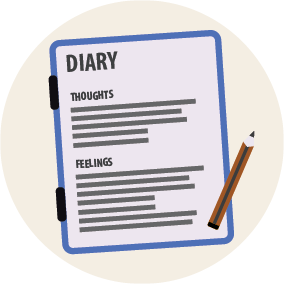
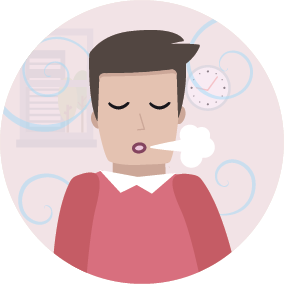

SUPPORTING SOMEONE IN A MENTAL HEALTH CRISIS
Anyone can experience a mental health crisis anywhere and at any time. When someone is in crisis, they may be at risk of harming themselves or others, so it is vitally important that a crisis plan is in place for when these situations arise.
Signs of a mental health emergency include extreme anxiety, panic attacks, self-harm, and contemplating suicide. It is important to assess the severity of the circumstances and act accordingly. Crisis care can involve the following:
• Calling a helpline • Going to A&E • Booking an emergency doctor’s appointment
URGENT HELP FOR A MENTAL HEALTH EMERGENCY
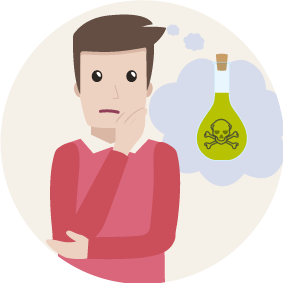

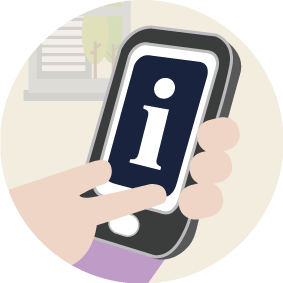

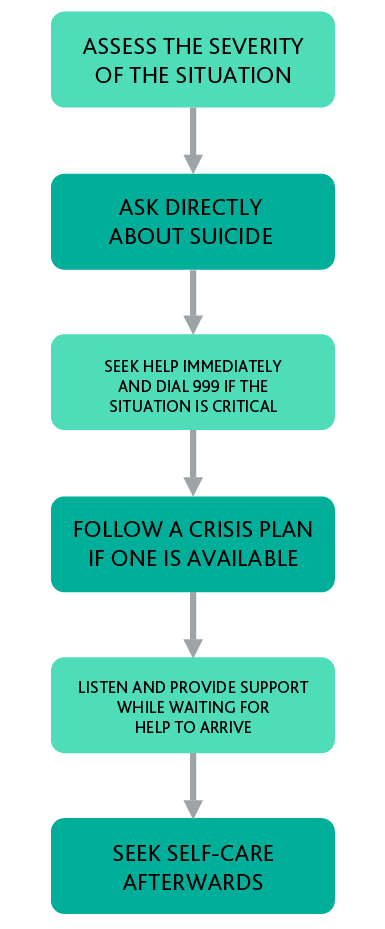
If someone’s mental state poses a risk to their own or someone else’s health and safety, they may be sectioned under the Mental Health Act and admitted to hospital for intensive support.
Suicidal thoughts
Always take someone who is experiencing suicidal thoughts seriously. Encouraging them to be open and talk about how they’re feeling can provide huge relief to a person in crisis. The aim is to provide a supportive space that is free of judgment, where a person can express themselves freely. It is important to listen and reply with open-ended questions. It is also essential to know when to seek professional support and to ensure your own safety when dealing with such situations.
Further information and support:
A-L-G-E-E
is the Mental Health First Aiders 5 step action plan
Approach, assess, and assist with any crisis

Listen non-judgementally
.

Give support and information
.

Encourage appropriate professional help

Encourage self-help and additional support

Mental Health in the Workplace Quiz
A short quiz about recognising and treating Mental Health




